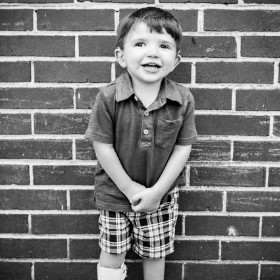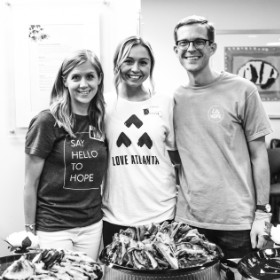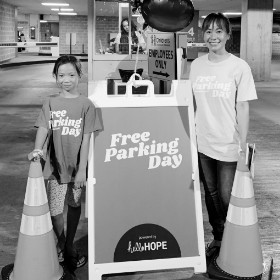What Do I Need to Know About My Child's Liver Transplant?
Just as symptoms lead to questions, a new diagnosis does the same. When a doctor delivers the news that a child needs a liver transplant, new questions immediately begin to form in a parent's mind. How did this happen? How long will my child have to wait to get a new liver? How often will we be in and out of the hospital while we wait for a liver transplant? What do we need to know that we don’t know that we need to know?
Dr. Rene Romero, Chief of Solid Organ Transplant Services at Children’s Healthcare of Atlanta, was kind to carve out time in his schedule for a conversation about how to help parents who are receiving the news that their child needs a liver transplant. Dr. Romero carries a deep passion for his work, and his extensive background has given him invaluable wisdom. Enjoy a glimpse into our conversation:
helloHOPE: What questions should parents ask when they learn their child needs a liver transplant?
Dr. Romero: When you're first meeting the team, it's a huge number of people. In our case it's over a couple of days. Even though there's a folder and a book with lots of material, it is an overwhelming amount of information coming at you all at once.
It’s important to find within that team who the point person is that parents contact first and how easy it is going to be to get in touch with them. The primary contact may not be the person with the answer, but it's at least a foot in the door to getting the answer.
A good place to start is to ask the questions, “Who are our team members?” and “When I call, who is it that I'm going to be speaking with, and how available will you be (or not be) to personally answer a question?” I don't think there's a right answer for that.
Parents should be able to get a sense pretty early for how often you are going to be seen, how often blood work will need to be done, and if it's a multifaceted problem, how well the team can communicate with their child’s other specialists.
Related to care, I also think it's reasonable to ask what kinds of things can be bundled together in terms of procedures or lab draws. It's not always easy because it's a lot of coordination, but sometimes it can be done. If there's a sedation that's going to happen, is that a good time to get a blood draw?
helloHOPE: What can parents do to prepare for their child’s liver transplant?
Dr. Romero: I always tell my patient families that these are usually marathons and not sprints.
The medical team should be there with you as the co-runners along the way. In any marathon, there are moments when you hit despair and you've got to push on through, and then you find moments of pure joy, but it's a really long marathon.
We have to pace ourselves.
I don't know that it’s any different than rearing a child; it's just that much more intense when you have medical conditions to deal with. Give yourself a daily reminder that in your medical team, you've got a partner that's going to continue on in the journey with you.
helloHOPE: If a parent is feeling tired and overwhelmed, it can be more difficult to process complex medical information. Any tips?
Dr. Romero: I can talk about an LFT or portal hypertension, and it doesn't really matter if a parent doesn’t understand it. As a parent, if you don't understand when your child’s doctor says something, ask and make them find a way for you to understand.
It’s important because it's how you're going to take care of your child.
The more you can understand that, the better. We almost always have computers in the exam rooms. A physician can pull up an image to help talk through a process, and there's a reason why they say a picture is worth a thousand words. Even though we may or may not be able to pull up, for example, a liver biopsy of your child, we could pull up a liver biopsy of what a normal liver looks like and what a biliary atresia liver looks like. Then it becomes a little bit more real.
If there's an X Ray or a CT scan or an MRI, we can pull up the image of your child and say, "Hey, this is the area that we're concerned about." Even though you may not have ever read an MRI, a physician can pull up an image of the cartoon and say, "This is where we're going to be looking, and now I'm going to show you on the MRI where that is."
Parents may not be able to get these examples and visuals at every visit but you certainly can get it some of the time.
helloHOPE: What can parents expect at the moment they get the transplant call and after the transplant is complete?
Dr. Romero: After a season of waiting for a variable amount of time, parents receive the call that it’s time to come in for the liver transplant. There is an intensity in that waiting period that comes to the surface.
The image I always give is that this call is like the time you've actually climbed up to the high tower of the diving board. You're looking down and you ask, "Do I really jump?" And you will. Just with a transplant, the enormity of the whole process kind of hits you right then. The worries do change some. I see that as just a change in the venue of the marathon, so to speak. Not that the race is over, it's just a little different.
Fortunately, at least in liver transplantation, the long term outcomes for children are very good. Hopefully it's the only transplant they will ever need, but certainly there are times when we have to do it again. The highest risk for needing a liver transplant is of course having had one, relative to the rest of the population. That concern is always there and that's always a tough thing to understand or to accept. It is not something we have to harp on a lot, fortunately. The way we hope to achieve the longest term positive outcome is to make sure we're teaching the best ways to maintain your child’s health. That should certainly be part of the post-transplant process.
The importance of the medication, how frequently it is given, why the lab monitoring is included, and explaining the why's of the processes helps parents understand that the numbers aren’t arbitrary, but that there's a reason and a pattern for what we do.
I think the biggest help in the understanding of that is connecting with the other parents who have preceded you in the transplant journey. Other parents and patients, though their stories are all unique, can offer some commonalities that can be shared.
helloHOPE: What gives you such passion for your work?
Dr. Romero: You're going to end up making me cry. In the world of transplant, it's the dramatic change that happens with the children from being very sickly to seeing them be healthy and happy like every other child.
That is tremendous — it's what drew me into the field when I was in training.
I always thought I was going into pediatrics, and I thought that I would focus on pediatric gastroenterology because nutrition was central to children's health. Then I went into training in the area, and that year — this was 1990 at Boston Children’s — happened to be when they were beginning to do liver transplants.
That was the most dramatic thing I saw. It was also the era when some technical advances both in immunosuppression and in surgical techniques were occurring. Living donor transplantation was just beginning. There was a reduction in deaths in children because of using these new techniques. It was the combination of so many things that were of interest to me: the science, the immunology, the intensity of the care, and the complexities of the spiritual and ethical components of transplantation. That passion drew me, and I see my role as hopeful. The spiritual aspect of it is also compatible with the Judeo-Christian aspect of giving of oneself to let others live. It encompasses all those things, and it’s that passion that I bring in with me each and every day.
Dr. Romero’s compassion and care for his patients is contagious, and we are so grateful to him for sharing his insights with our community!
Other resources you may be interested in:
Loading...













